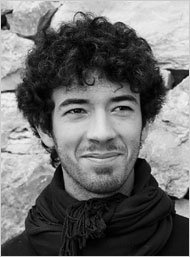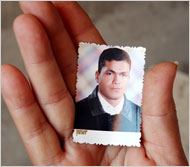Freed Egyptian Protester Describes Ordeal, but Fate of Seized Blogger Is Unknown

Philip Rizk, a blogger and peace activist, was released days after being detained by Egyptian security forces after his participation in a march to raise awareness about conditions in Gaza. Christina Rizk
CAIRO — For more than four straight days, Philip Rizk said, he was blindfolded, handcuffed and interrogated around the clock by Egyptian state security agents who abducted him on Friday after he took part in a march in support of Gaza.
Early Wednesday morning, with neither warning nor explanation, he was driven home and dropped off, without having been charged.
“They said I was a liar, that I was not telling them the truth, threatening me that I would be punished in certain ways unless I gave them the whole story,” Mr. Rizk said in a telephone interview on Wednesday.
His arrest and the government’s refusal to provide any information while he was in custody provoked a tremendous international response. The German government and legions of former and current classmates and professors rushed to the defense of Mr. Rizk, a dual Egyptian-German citizen who studied at Wheaton College in Illinois and is a graduate student at American University in Cairo.
His family also started a Facebook group to raise awareness of his case, and within days, more than 6,000 people around the world joined.
The Egyptian government has not explained Mr. Rizk’s arrest or his release, so it is impossible to know if his background helped.
But two hours away from Mr. Rizk’s leafy upscale neighborhood in Cairo, Amaal Abdel Fattah Taha was red in the face, sobbing in fear, terrified that her son, Diaa Eddin Gad, had been killed by the state. Mr. Gad, 23, a high school dropout and blogger, was arrested Friday, too, when four police officers grabbed him as he stepped outside the door of his family’s apartment.
Like Mr. Rizk, he was taken away after he participated in public demonstrations in support of Gaza — and in opposition to Egypt’s policies toward Gaza. And as in Mr. Rizk’s case, the government has not said where he is being held, or why, or when he may come home.
“You think they killed him? Why are they hiding him? Did they kill him?” his mother cried inside their run-down, cramped two-room apartment in a village just north of Tanta, a city in the Nile Delta region.
The Egyptian government has grown increasingly intolerant of those who criticize its policies regarding Gaza. Egypt has insisted that it is Israel’s responsibility to provide for Gaza. But because of the recent war and the humanitarian crisis there, many Egyptians have called on their government to open its one border with Gaza, at Rafah. The government has refused, except to let some medical supplies pass through.
To silence the critics, the government has turned to its internal security forces, whose ranks are twice as large as those in the nation’s military, and to an emergency law decades old that allows the police to detain anyone, effectively without charge and without explanation.
Mr. Rizk was arrested after he took part with 14 others in a peaceful six-mile walk in support of the Palestinians in Gaza.
Mr. Gad was arrested after he took part in a peaceful demonstration in Cairo organized by the Wafd Party, a largely powerless, secular liberal political party.
But he is also known as the man behind an Arabic-language blog, soutgadeb.blogspot.com — “An Angry Voice.” He describes himself on the blog as an Egyptian citizen who loves his country. He goes on to mock President Hosni Mubarak as a “Zionist agent.” At one point, he refers to the president as Ehud Mubarak, a play on the name of Israel’s defense minister, Ehud Barak.
Insulting the president is punishable by a year in prison.
A spokesman for the Ministry of the Interior, which oversees all internal security matters, said: “The related bodies are examining his case, and if there is nothing they will let him go. It is a regular procedure.”

Amaal Abdel Fattah Taha holds a picture of her son, Diaa Eddin Gad, who was taken from his home by security forces last Friday. His whereabouts remain unknown. Credit Shawn Baldwin for The New York Times
All that Mr. Gad and Mr. Rizk share is a conviction that Egypt is not doing enough to help Palestinians in Gaza — and the fact that they were arrested for it.
Mr. Gad lives with his mother, his father and two sisters. He shares a bare bedroom with his sisters, Noura, 24, and Iman, 15. His father, Abdel Samea, 61, is a retired utility worker with a limp from a stroke and a pension that amounts to about $200 a month. His mother, Amaal, 48, has never worked. There is one common room in the apartment, a box of a space crowded with chairs, a table and Mr. Gad’s window to the world, a desk with a Samsung computer and a modem.
Around the same time that Mr. Rizk was in the middle of his six-mile march, Mr. Gad was seated at his computer working on his blog. His mother had just laid out lunch and his older sister was behind him studying for medical school. His phone rang, he walked outside, so as not to disturb his sister, and was jumped by four officers.
“He was screaming, ‘Mama, Mama, help me,’ ” Ms. Taha said, struggling to keep her composure. But the memory was too painful.
The Wafd Party alerted the Arabic Network for Human Rights Information, which assigned lawyers to try to help the family. But lawyers there said they feared that this case could take much longer to resolve than Mr. Rizk’s, partly because the government often showed greater deference to foreigners and dual citizens.
“They are trying to silence the voices that criticize the government’s performance and send a message by assaulting and kidnapping to say that criticism will not be tolerated,” said Gamal Eid, executive director of the network.
While nothing is known, yet, of Mr. Gad’s experience, on Wednesday Mr. Rizk began to describe his ordeal. He said he was repeatedly interrogated. The police, aggressive and threatening, were searching for something to charge him with, he said.
They accused him alternately of being a spy for Israel and of running arms for Hamas, two incompatible roles. Mr. Rizk, who turns 27 on Thursday, said he was never beaten or physically abused. By Wednesday evening, he said he wanted to redirect public attention from his case to Gaza and to others, like Mr. Gad.
“I was held for four days, but the people of Gaza continue to be held in a form of prison, and there are others in Egypt who are also being held,” he said. “I want to move the attention to others who are still in this situation.”